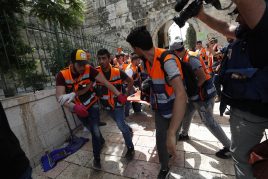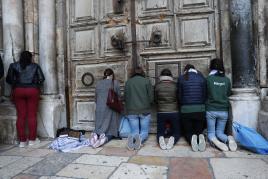
“We overcame the epidemic but we are unable to eradicate acts of violence, with the cycle of bloodshed that keeps repeating in this land. Once the flames start spreading, they are hard to contain.”
 Father Francesco Patton, Custos of the Holy Land, comments on the armed conflict in Jerusalem, Gaza and in many cities in Israel and the West Bank, causing dozens of deaths among Palestinians and Israelis. Including many children. “What we are seeing is a phenomenon of hate”, the Custos said. “Escalating polarisations triggered outbreaks of devastating hate that were unexpected in many respects. The death of civilians, with the toll rising every day, fuels a spiral of violence on both sides. These incidents are also undermining the harmonious coexistence between Arab-Israelis and Jewish-Israelis in Israeli cities, where beatings, riots, looting and intimidation have occurred over the past few days.”
Father Francesco Patton, Custos of the Holy Land, comments on the armed conflict in Jerusalem, Gaza and in many cities in Israel and the West Bank, causing dozens of deaths among Palestinians and Israelis. Including many children. “What we are seeing is a phenomenon of hate”, the Custos said. “Escalating polarisations triggered outbreaks of devastating hate that were unexpected in many respects. The death of civilians, with the toll rising every day, fuels a spiral of violence on both sides. These incidents are also undermining the harmonious coexistence between Arab-Israelis and Jewish-Israelis in Israeli cities, where beatings, riots, looting and intimidation have occurred over the past few days.”
“Not all the local population is involved in this whirlwind of violence, many have distanced themselves from it,” the Custos said.
“Unfortunately, street gangs from other areas are inciting unrest without the police being able to prevent or quell it.”
 Thus violence at the hands of the few becomes a political tool. The absence of the international community only serves to strengthen these extremist stances. The only person who has spoken out clearly over the last few days is Pope Francis, a spiritual and moral leader who repeatedly called for moderation, dialogue and to put down the arms. By contrast, the political leaders of the major world powers – that have the necessary instruments of deterrence – seem to lack not only the voice but also the determination to bring the warring parties to reach a truce and eventually sit at the negotiating table.”
Thus violence at the hands of the few becomes a political tool. The absence of the international community only serves to strengthen these extremist stances. The only person who has spoken out clearly over the last few days is Pope Francis, a spiritual and moral leader who repeatedly called for moderation, dialogue and to put down the arms. By contrast, the political leaders of the major world powers – that have the necessary instruments of deterrence – seem to lack not only the voice but also the determination to bring the warring parties to reach a truce and eventually sit at the negotiating table.”
“In the light of such circumstances, I often wonder why arms supplies can easily bypass all embargoes and even the most impervious borders, while medicines, vaccines and basic necessities fail to enter the territory other than with extreme difficulties.
Christians caught between two fires. “So far, at least, we have not been targeted”, said Father Patton, “and there have been no attacks against us. The violence did not spread to the Holy places, and shrines run by the Custody of the Holy Land are open: reports from our local communities are of concern about the escalation of violence. The vast majority of local Christians are Arabs and foreign migrant workers, and they are a minority.
This puts them in the situation of being caught between two larger players fighting each other; and it so happens that they are overwhelmed, and not by their own choice.
Suffice it to say that one of the first victims of the rockets fired from Gaza was an Indian woman, a migrant, employed as a carer. She was a Christian believer, regularly attending our chaplaincy for Indian Catholics.”
Borders reopened to pilgrims. On May 23 Israel will begin welcoming vaccinated groups of pilgrims and tourists. Only small organised groups will be admitted in the first phase, according to the guidelines. “This is an important date for which we have been preparing for some time,” the Custos said. “During this year of compulsory closure of the shrines, we carried out maintenance works to improve their reception and accessibility for all, with special consideration for the disabled. Our efforts also covered liturgical aids. For instance, the Italian Bishops’ Conference has approved the new missal, so we updated accordingly the Mass books in Italian, found at the various shrines. We also added new languages, especially Asian languages including Korean, Indonesian and Chinese. I have to say that the re-opening to international tourism has not started under the best auspices given the present state of events.”
 The courage of being pilgrim. However, the Custos said, “the return of tourists and pilgrims would deeply benefit the situation in the Holy Land. Pilgrims have always contributed to peace-building, as well as to economic growth and employment. These are two primary needs that, if met, would reduce social tensions. Moreover, the presence of pilgrims and tourists would encourage their home countries (public opinion, politicians and diplomats) to take a greater interest in what is happening here. At this stage, it is important to
The courage of being pilgrim. However, the Custos said, “the return of tourists and pilgrims would deeply benefit the situation in the Holy Land. Pilgrims have always contributed to peace-building, as well as to economic growth and employment. These are two primary needs that, if met, would reduce social tensions. Moreover, the presence of pilgrims and tourists would encourage their home countries (public opinion, politicians and diplomats) to take a greater interest in what is happening here. At this stage, it is important to
have the courage to organise pilgrimages in order to foster pacification efforts on site.
Thus, in the midst of so many shadows, we are also trying to sow seeds of hope.” Some pilgrims have arrived nonetheless: “Christians from our local communities, individually or accompanied by their parish priests, are rediscovering the Holy Shrines and the places where Jesus walked, which contribute to strengthening their identity as Christians of the Holy Land. Our hope is that in rediscovering themselves pilgrim, local and non-local Christians alike may bring some peace to this tormented land.”











